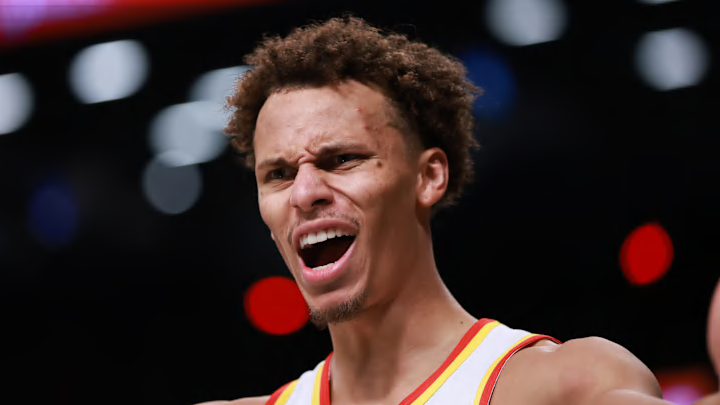Just when it seemed as though the Atlanta Hawks could revel in the emergence of rising star Dyson Daniels, the impossible decision of how to handle his contract extension negotiations has reared its head. Exceptionally talented and already among the NBA's elite defenders, it should be as simple as giving Daniels a hefty new deal.
As Atlanta searches for ways out of basketball purgatory, however, the reality of the salary cap is even more daunting than the average franchise may view it.
Daniels was sensational in 2024-25, captivating the masses with his growth on both ends of the floor. The 22-year-old averaged 14.1 points, 5.9 rebounds, 4.4 assists, a league-leading 3.0 steals, 0.7 blocks, and 1.1 three-point field goals made.
For his efforts, Daniels won the Most Improved Player award, finished second in Defensive Player of the Year voting, and earned an All-Defensive First Team nod.
The praise was well-earned, as Daniels emerged as the NBA's preeminent ball hawk and a vastly improved offensive player. The reality remains, however, that his breakout season has thus far been the only campaign during which he's played more than 22.3 minutes per game.
As such, the Hawks must answer a question that will influence Daniels' future, the Trae Young era, and the franchise's maneuverability: What kind of contract has he earned?
How exactly should the Hawks structure a Dyson Daniels extension?
One thing is clear as Atlanta approaches these precarious negotiations: Signing Daniels to an extension would be a wise decision. Despite the limited sample size of his success, he's a 22-year-old defensive ace who represents a future both with and without Young in the mix.
After giving Jalen Johnson a five-year, $150 million contract extension, handing Daniels a long-term deal would seemingly confirm the Hawks' commitment to sustainable growth.
The hurdle is coming up with a figure that benefits both Daniels and the team. If Atlanta is unable to sign him to an extension, then the market will be set by the competition, as Daniels is certain to receive offer sheets during restricted free agency in 2026.
Thankfully, signing him to an extension would enable Atlanta to avoid a surge in market value beyond the hefty price he's already due to be paid. The question is: How much might that be?
Jaden McDaniels may have set the market for Dyson Daniels
There's a case to be made that Jaden McDaniels set the precedent for Daniels' new deal back in 2023. McDaniels signed a five-year, $131 million extension with the Minnesota Timberwolves after establishing himself as an invaluable defensive presence who could provide respectable contributions on offense.
Much like Daniels, McDaniels had also just completed his first season during which he played upward of 30.0 minutes per game at the time he signed his deal.
As such, something in the range of four years and $104.8 million—equating to McDaniels' average of $26.2 million per season—could be the starting point for Daniels' negotiations. Eric Pincus of Bleacher Report made a similar projection when he suggested that Atlanta could hand out a four-year, $112 million extension to the NBA's Most Improved Player.
Regardless of what the actual figure is, McDaniels' contract is a strong frame of reference for the negotiations that are soon to come.
Daniels has the advantage as an award-winning player, but McDaniels' leg up was that he had a larger sample size of success and a near 40.0 percent efficiency rate from beyond the arc. Perhaps that evens out in the end, as Daniels is still a 34.0 percent shooter who had never previously scored more than 5.8 points per game.
Offense is far from the only factor to consider, but it may be Atlanta's saving grace in regard to being able to mitigate risk on Daniels' extension.
How sustainable is Dyson Daniels' success?
The hurdle in any conversation about Daniels' contract is that he averaged just 20.0 minutes in 120 games played between the 2022-23 and 2023-24 seasons. He shot just 31.2 percent from beyond the arc during that time and buried just 59.3 percent of his free throws in 2024-25.
Daniels' value on defense is impossible to dispute, but if the Hawks manage to develop into a postseason-caliber team, his shooting woes may soon become a talking point.
For as fair as those concerns may be, Daniels is coming off of a season during which he increased his year-over-year scoring average by 5.6 points per 36 minutes. He also improved his field goal percentage by 4.6 percent and his three-point percentage by 2.9 percent.
It's also worth noting that Daniels began to display elite proficiency as a three-point shooter as the season progressed, burying 39.7 percent of his 2.4 attempts per game after Feb. 1.
Compounded by Daniels' intriguing value as a playmaker—a career average of 4.6 assists per 36 minutes is nothing to scoff at—there's enough offensive upside to justify an investment. If Daniels can sustain his efficiency from the final months of the 2024-25 season, he'll even outplay his projected contract.
It's a gamble on a player who has a limited sample size of success and a hefty contract coming his way, but Daniels has already done far too much for Atlanta to ignore his value.
